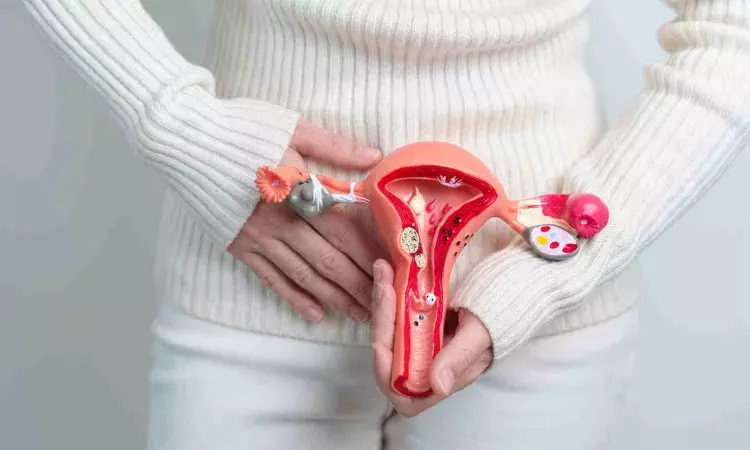- Home
- Medical news & Guidelines
- Anesthesiology
- Cardiology and CTVS
- Critical Care
- Dentistry
- Dermatology
- Diabetes and Endocrinology
- ENT
- Gastroenterology
- Medicine
- Nephrology
- Neurology
- Obstretics-Gynaecology
- Oncology
- Ophthalmology
- Orthopaedics
- Pediatrics-Neonatology
- Psychiatry
- Pulmonology
- Radiology
- Surgery
- Urology
- Laboratory Medicine
- Diet
- Nursing
- Paramedical
- Physiotherapy
- Health news
- Fact Check
- Bone Health Fact Check
- Brain Health Fact Check
- Cancer Related Fact Check
- Child Care Fact Check
- Dental and oral health fact check
- Diabetes and metabolic health fact check
- Diet and Nutrition Fact Check
- Eye and ENT Care Fact Check
- Fitness fact check
- Gut health fact check
- Heart health fact check
- Kidney health fact check
- Medical education fact check
- Men's health fact check
- Respiratory fact check
- Skin and hair care fact check
- Vaccine and Immunization fact check
- Women's health fact check
- AYUSH
- State News
- Andaman and Nicobar Islands
- Andhra Pradesh
- Arunachal Pradesh
- Assam
- Bihar
- Chandigarh
- Chattisgarh
- Dadra and Nagar Haveli
- Daman and Diu
- Delhi
- Goa
- Gujarat
- Haryana
- Himachal Pradesh
- Jammu & Kashmir
- Jharkhand
- Karnataka
- Kerala
- Ladakh
- Lakshadweep
- Madhya Pradesh
- Maharashtra
- Manipur
- Meghalaya
- Mizoram
- Nagaland
- Odisha
- Puducherry
- Punjab
- Rajasthan
- Sikkim
- Tamil Nadu
- Telangana
- Tripura
- Uttar Pradesh
- Uttrakhand
- West Bengal
- Medical Education
- Industry
Routine Abdominal Drainage Not Beneficial in Colorectal Endometriosis Surgeries: Study

A recent study questioned the longstanding practice of using prophylactic abdominal drainage (AD) following colorectal surgery for endometriosis. The key findings were published in the recent issue of European Journal of Obstetrics and Gynecology and Reproductive Biology.
The study spanned from February 2019 to July 2023 and included a total of 215 patients who underwent a minimally invasive procedure to address endometriosis affecting the colorectal area. The research by Adrien Crestani and team employed a propensity score matched analysis to evenly distribute patient characteristics across two groups, where one group received abdominal drainage and the other group did not. This method allowed for a fair comparison of postoperative outcomes between the two sets of patients.
The results were adjusted to account for similar clinical backgrounds and surgical procedures and indicated that patients who had an abdominal drain inserted experienced longer hospital stays and a higher rate of postoperative complications. The statistical analysis showed a significant difference, where the individuals undergoing AD stayed longer in the hospital (p < 0.001) and encountered more complications (p = 0.03) when compared to their counterparts who did not receive a drain.
The study found no significant differences in rates of hospital readmissions, repeat surgeries or severe complications between the two groups by suggesting that the primary differences were confined to length of stay and initial postoperative recovery.
These findings are crucial as they challenge the traditional use of prophylactic abdominal drainage in colorectal surgeries for endometriosis. For years, AD has been routinely employed by surgeons with the belief that it helps by reducing the risk of complications like the infection or fluid accumulation. Also, this study suggests that the practice may be unnecessary and could potentially worsen patient outcomes.
The study adds pivotal evidence to the valuation of routine abdominal drainage in endometriosis surgery and it appears that the practice may need reevaluation in term of these findings which associate it with prolonged hospitalization and increased complications. As this retrospective study brings out detailed data, the results will need to be confirmed through further prospective trials. Overall the implications are significant and could influence future guidelines and standards of care in the treatment of endometriosis involving colorectal surgery.
Reference:
Crestani, A., de Labrouhe, E., Le Gac, M., Kolanska, K., Ferrier, C., Touboul, C., Dabi, Y., & Darai, E. (2024). To drain or not to drain: A propensity score analysis of abdominal drainage after colorectal surgery for endometriosis. In European Journal of Obstetrics & Gynecology and Reproductive Biology. Elsevier BV. https://doi.org/10.1016/j.ejogrb.2024.04.028
Neuroscience Masters graduate
Jacinthlyn Sylvia, a Neuroscience Master's graduate from Chennai has worked extensively in deciphering the neurobiology of cognition and motor control in aging. She also has spread-out exposure to Neurosurgery from her Bachelor’s. She is currently involved in active Neuro-Oncology research. She is an upcoming neuroscientist with a fiery passion for writing. Her news cover at Medical Dialogues feature recent discoveries and updates from the healthcare and biomedical research fields. She can be reached at editorial@medicaldialogues.in
Dr Kamal Kant Kohli-MBBS, DTCD- a chest specialist with more than 30 years of practice and a flair for writing clinical articles, Dr Kamal Kant Kohli joined Medical Dialogues as a Chief Editor of Medical News. Besides writing articles, as an editor, he proofreads and verifies all the medical content published on Medical Dialogues including those coming from journals, studies,medical conferences,guidelines etc. Email: drkohli@medicaldialogues.in. Contact no. 011-43720751


